Dylan Baca & Tristan Espinoza on Commemorating Indigenous Peoples’ Day and Indigenous Youth Advocacy
Dylan Baca (CC‘25) and Tristan Espinoza (CC‘25) are both board members of the Indigenous Peoples’ Initiative (IPI), a national, non-partisan, youth-led organization creating opportunities for Indigenous people. Dylan, who founded the organization in 2019, is active in advocating for the recognition of Indigenous Peoples’ Day at the local, state and national levels. After meeting Dylan at Columbia, Tristan joined these efforts.
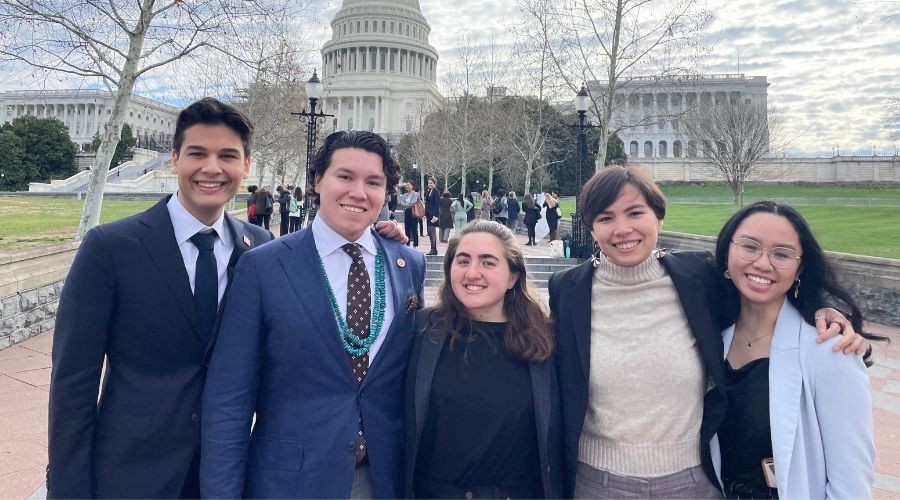
Their interviews have been edited for length, clarity and style.
“It is an act of patriotism to understand our collective history."
Can you share a little bit about yourself and some of the experiences that led you to Columbia?
Dylan: My name is Dylan Baca, and I use he/him pronouns. I am a sophomore at Columbia College studying political science and American history and a citizen of the White Mountain Apache Tribe and Navajo Nation. At an early age, I knew I always wanted to help people. With the influence of my mother, I joined the Governor’s Youth Commission and was then later appointed to serve as the Co-chair of the Arizona Human Trafficking Prevention Committee for the Governor’s Office of Faith, Youth, and Family. Later on, I served as a youth advisor to the State Superintendent of Public Instruction. Eventually I co-founded the IPI with Arizona State Senator Jamescita Peshlakai. I think all these experiences have collectively drawn me to Columbia. I saw coming to the City as an opportunity to learn more about the world, but also my place in it.
Tristan: My name is Tristan Espinoza. My pronouns are he/him, and I am studying political science. I am a member of the Osage Nation tribe and am Hispanic. I became involved in politics at a young age when I learned there's no missing persons report for Native American women within this country. I was thinking, Oh, my gosh, what if my family goes missing?
I slowly got into politics after that. I started on the Princeton Mayor's Youth Council and later joined Congressman Van Taylor’s Congressional Youth Advisory Council. In the summer of 2020, I organized my town's first Black Lives Matter protest and saw I could create real, tangible change by bringing people together. I worked to get new city officials elected who represented and welcomed my town’s diversity. I also worked with our local police department to make sure they were listening and learning from our Black Lives Matter rally.
How have you seen value in Indigenous Peoples’ Day being recognized? What is the best way for people to participate in commemorating this day?
Dylan: We're seeing a movement to recognize Indigenous heritage. This holiday allows people to be able to say, I'm proud to be Native American, I'm proud to be Native Hawaiian, or I'm proud to be Alaskan Native, or Indigenous. It also allows people to tell a more truthful version of our history.
I like to share the story of my great-grandmother, who lived to be in her 90s. She was born in 1923, one year before Native Americans were considered U.S. citizens and one year before the closure of Fort Apache—which existed to eradicate Native Americans. She didn’t have the ability to vote in national elections until the 1960s, and couldn’t vote in Arizona state elections until the 1970s. Recently, we've seen Native Americans become members of Congress and sit in the corridors of power. We've made slow incremental change, yet there's still more to create.
The celebration of Indigenous Peoples’ Day alone will not alleviate poverty on reservations. It won’t eliminate domestic violence or terminate every instance of discrimination. Those things are up to us. The decisions and choices we make require us to speak out until our values are fully reflected in our laws and communities. What Indigenous Peoples’ Day does show us is an example of tangible progress. It illustrates, even in the face of oppression, that America has moved forward. A great nation does not shy away from the truth, it strengthens us, emboldens us and fortifies us. It is an act of patriotism to understand our collective history.
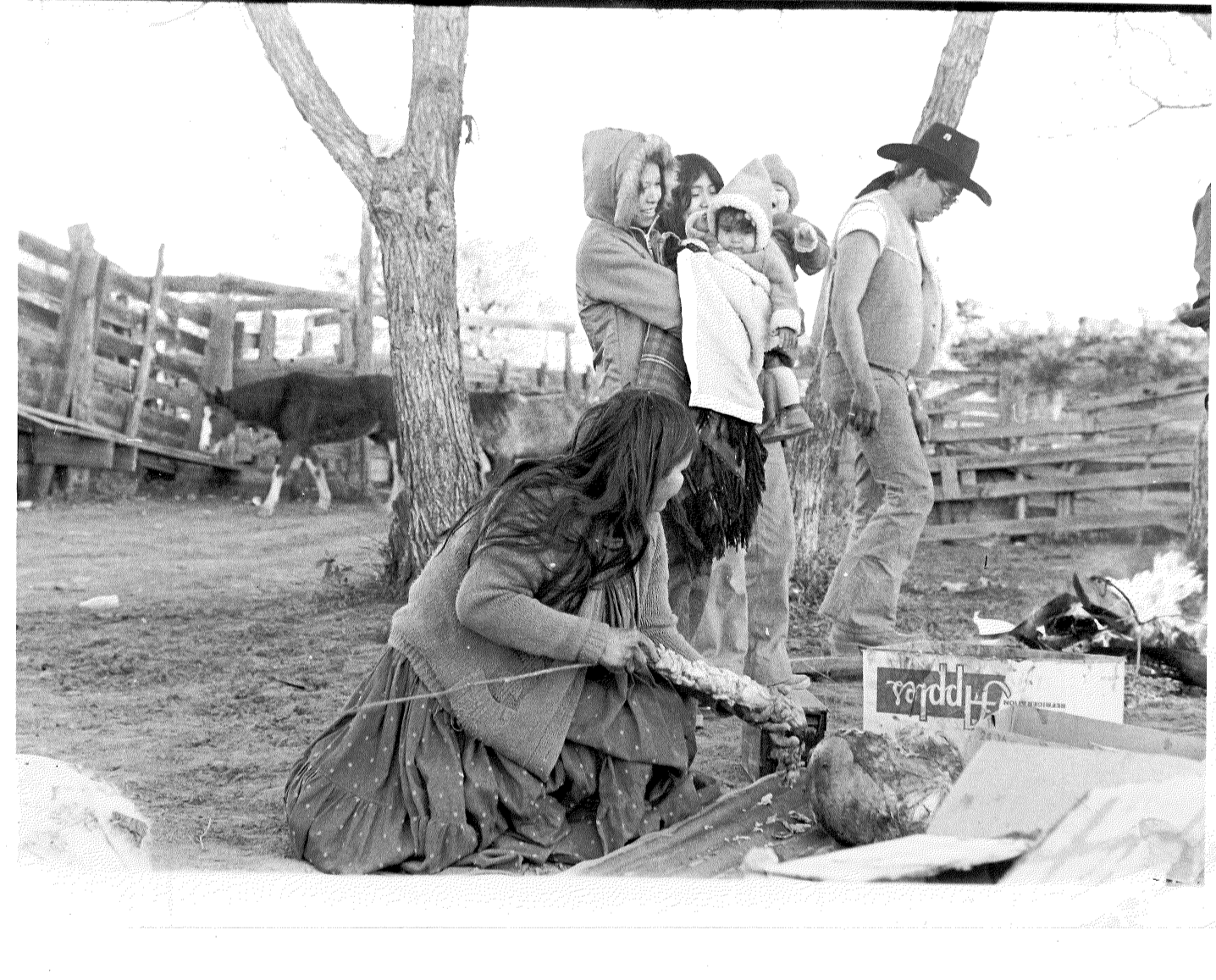
Tristan: This upcoming Indigenous Peoples’ Day is important because we're moving to a future where new voices are starting to be represented. We also want to make sure no voices are left behind. We have always existed here. Please give us the space to celebrate ourselves.
My dad is Hispanic, and my mom is Native American. My family were some of the only people with Native American heritage within my small, rural Texas community. Growing up, I would talk to my mom about Indigenous Peoples’ Day. Then I would go to school and it's Christopher Columbus Day. Recognizing Indigenous Peoples’ Day means my mom and I have a space to share our story. Anyone who wants to listen is welcome. We are trying to have an open space where people can see what Indigenous representation looks like. We are different and so multifaceted. We hope you’ll see our culture thrive right in front of you.
I've always felt my life was like the show, Survivor. I was thrown onto an island with people and tools I didn't choose and told to make the best of it. I did make the best of it in my small town. Now that I'm in college, I feel like I made it off the island but I want to make sure no kid ever feels like they're on an island. No Indigenous kid, no queer kid, no Hispanic kid. I want to make sure all of them are protected and not just on an island, but as part of a thriving community. If commemorating Indigenous Peoples’ Day can help one kid get off the island, we've done what we intended.
"I've always felt my life was like the show, Survivor. I was thrown onto an island with people and tools I didn't choose and told to make the best of it."
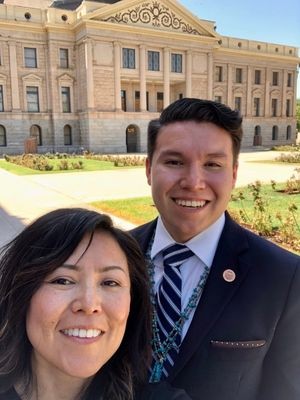
Can you share about your time working with the Indigenous Peoples' Initiative (IPI)?
Dylan: This has been my passion project since I was 16 years old. In March of 2019, I had a conversation about Native American policy with Arizona Senator Jamescita Peshlakai. We wanted to remove stereotypes and stigma that Native American communities face, and gain recognition for Indigenous Peoples’ Day. I worked with Senator Peshlakai on legislation within the Arizona State Legislature. However, when the pandemic struck, the legislature was suspended and lobbying was difficult. We worked with the Governor's office to create a proclamation, recognizing Indigenous Peoples’ Day in 2020. That marked a monumental moment.
"We've made slow incremental change, yet there's still more to create."
The IPI began to look at a more national platform. We partnered with Representative Norma Torres of California, to announce a bill to recognize Indigenous Peoples Day, HR 5473. We were able to amass a total of 81 co-sponsors, by talking to those offices individually. We also worked with Biden's campaign team, transition team, and White House staff on the first Indigenous Peoples’ Day proclamation. By the singular pen stroke of President Biden's hand, Indigenous Peoples’ Day became law in the land for a year. Everything fell still for a moment.
What I love about IPI is it’s youth led, we work with tribal communities, and we're non-partisan. The emphasis we put on working with tribal communities directly is extremely important—we won't push an issue unless we have the support of tribes. By operating that way, we are able to say what tribes want – rather than trying to speak for them.
Tristan: I got to know Dylan here at Columbia, and he invited me to be part of IPI. Since the end of April, I have been working with the White House to help ensure President Biden will sign another proclamation recognizing Indigenous Peoples’ Day in 2022. We’ve also been working on an event where the New York City Mayor and Governor will potentially sign a proclamation recognizing Indigenous Peoples’ Day in the State of New York and the City of New York.
"By the singular pen stroke of President Biden's hand, Indigenous Peoples’ Day became law in the land for a year. Everything fell still for a moment."
What pieces of your heritage do you enjoy and value the most?
Dylan: My dad is white, and my mom is Native American. Growing up, I was struggling with an identity crisis where I could play the white card, but I also felt representative of the Native American population too. Not feeling I have to identify with one or the other has been important for me. It's allowed me to embrace more of my heritage and my love of where I come from: the White Mountain Apache Tribe and Navajo Nation.
Tristan: Being Indigenous, family means everything. That is our unit; that is how we function. I appreciate that I've had such strong family support. Being openly queer and having two parents who are not white, it can be hard to be out in communities that are predominantly white, privileged, and/or rural. Having family support means everything to me, and I'm forever thankful.
I'm both proud and happy to have these two amazing parents because they make me feel connected to the world around me, whether I'm in Texas with my family or here in New York. I have this sense of belonging because of them.
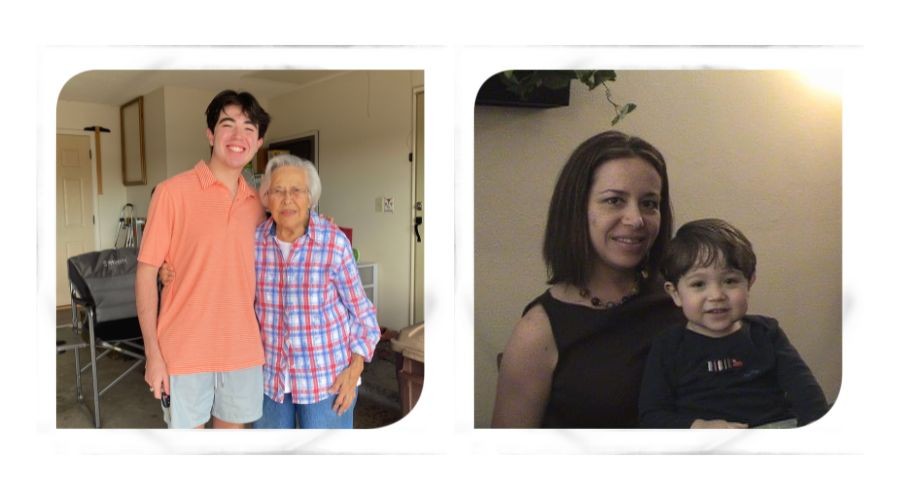
Everything I do is for my family and to represent my heritage, those who came before me, and those who fought for me to have a voice today. More specifically, I would not be where I am if it was not for hardworking, strong, and resilient Indigenous women. I want to dedicate this upcoming Indigenous Peoples’ Day to my grandmother and my mom for all of their sacrifices and for lighting the way for me to tell my story today. I owe everything to them and I’m so thankful to have two of my biggest supporters and inspirations in my corner.
"Being Indigenous, family means everything. That is our unit; that is how we function."
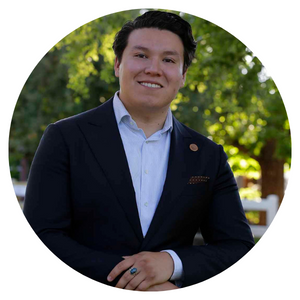
Dylan Baca is the founder of Indigenous Peoples’ Initiative (IPI), a national, non-partisan, youth-led organization creating opportunities for Indigenous people. He is studying political science and American history at Columbia College.
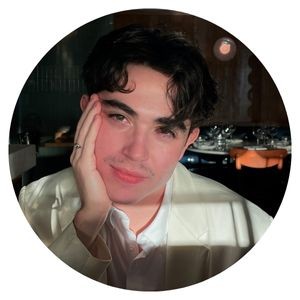
Tristan Espinoza is board member for the Indigenous Peoples' Initiative (IPI) and is studying political science at Columbia College.
